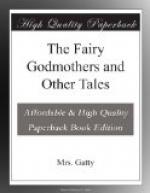“What are we to do with that child?” cried Madeline to her husband, as they were going to bed. “He is beginning as foolishly as ever this year, in spite of being a year older. I really shall at last be inclined to think that in spite of all her fair promises of friendship and assistance, and of never injuring the family, the Fairy Eudora must secretly frighten the child in some way we don’t know of.”
“No such thing, my dear Madeline; I cannot for a moment believe it;” said her husband. “I have a better opinion of your relations, the Fairies, than you have yourself. I am sure Eudora would not break her word for the world; and there is no mystery about Roderick’s folly. He is full of fancies of all sorts,—some pretty, and some silly ones; and we must do every thing we can to cure him of the silly ones. It certainly is a very hard matter to accomplish, for I perceive he admits the truth of every thing you say, and yet is as silly as ever at the end. I heartily wish the Fairy Eudora would interfere to cure him of his nonsense!”
“And so do I, if she could, and would,” sighed Madeline; “but she has quite deserted us. Besides, if she were to come, I don’t see how she could possibly do any good. Fairies cannot change little boys’ hearts; and I must confess I never yet got any good myself from having a Fairy ancestress, and I have no confidence in them.—Still,” pursued the good lady, as she laid her head on her pillow, “I am not able, it appears, to convince Roderick myself; and therefore I feel, with you, that I wish the Fairy would come and try.”
“I fear it is in vain to say so now, Madeline. We have wished the poor creature out of the way so often for the last ten years, that it is not very likely a single wish the other way will bring her to us.”
“No, indeed,” murmured the Fairy Eudora, who at that moment was standing on the shore of the Fairy Island; “you are a pretty pair, you two, to think of such a thing! I begged to be allowed to come about the place years ago, and you didn’t refuse; but you always kept me away by wishing I mightn’t come; and now, because you are puzzled to know what to do with your silly child, you want me with you for the first time these ten years! Oh, you selfish people, don’t fancy I’ll come near you!” And the justly angry Fairy stamped her foot in indignation, and retired into private apartments in the palace.
Do not be surprised at what you have just heard, my dear children; for though you may have never thought about the power and importance of wishes, there is, I assure you, a great deal of both one and the other belonging to them. Some people talk, indeed, of “mere wishes,” as if they were trifles light as air; but it is not so. To prove this, first think what importance is attached to them in the Scriptures. Wishes are a sort of porch or doorway to actions. In the Tenth Commandment we are forbidden to wish for what belongs to our neighbour;—for who is so likely to break the Eighth Commandment, and steal, as the man who breaks the Tenth, and wishes for any thing that is not his?




